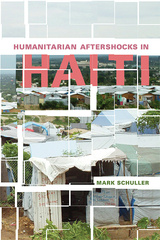Reclaiming Haiti's Futures
Returned Intellectuals, Placemaking, and Radical Imagination
Haiti was once a beacon of Black liberatory futures, but now it is often depicted as a place with no future where emigration is the only way out for most of its population. But Reclaiming Haiti's Futures tells a different story. It is a story about two generations of Haitian scholars who returned home after particular crises to partake in social change. The first generation, called jenerasyon 86, were intellectuals who fled Haiti during the Duvalier dictatorship (1957–1986). They returned after the regime fell to participate in the democratic transition through their political leadership and activism. The younger generation, dubbed the jenn doktè, returned after the 2010 earthquake to partake in national reconstruction through public higher education reform. An ethnography of the future, the book explores how these returned scholars resisted coloniality's fractures and displacements by working toward and creating inhabitability or future-oriented places of belonging through improvisation, rasanblaj (assembly), and radical imagination. By centering on Haiti and the Caribbean, the book offers insights not just into the Haitian experience but also into how fractures have come to typify more aspects of life globally and what we might do about it.
Reclaiming Haiti's Futures is a truly wonderful contribution to Caribbean Studies—a deeply meditative work of scholarship, suffused with care for the present, consideration of the past, and an urgency for a Caribbean future beyond our current neocolonial predicament.
Reclaiming Haiti's Futures stands as a courageous act of decoloniality and as a powerful reimagining of Haiti’s intellectual futures and societal structures. Dubuisson traces the history of the Haitian intelligentsia and calls upon local academics and returnees to work across fractures to create a stronger higher education system, a more robust civil society, and ultimately envision new democratic futures for Haiti and other nations of the Global South.'
Note on Text
Abbreviations
Chronology
Introduction: “Homing”: A Futural Orientation
Part I Fractures
1 Colonial Ruptures in the Caribbean and the Displacement of Haitian Intellectuals
2 Internal Displacements: Tracing the Generational Aspects of Exile and Diasporic Homecomings
3 The “Crisis Factory:” Improvising Place in the (State) University of Haiti
Part II Sutures
4 Rasanblaj: Assembly beyond Coloniality’s Fractures
5 Imagining Emancipatory Caribbean Futures
Coda: Reclaiming Haiti’s Futures: A Call for Planetary Suturing and Repair
Acknowledgments
Notes
References
Index








